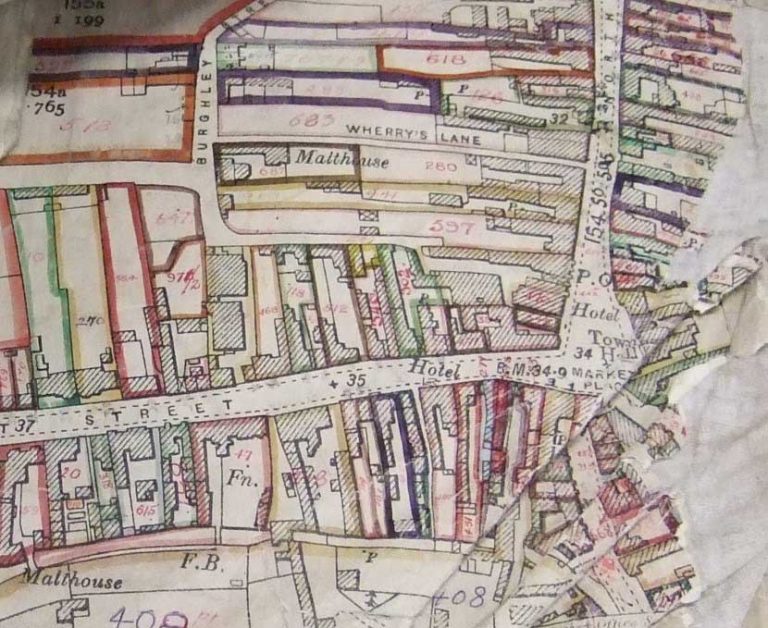An invitation for hands-on volunteering for map preservation
(You don’t have to be a map specialist to help. I’m not!)
Land boundaries, property valuations or disputed rights of way – this unique information from Inland Revenue Valuation maps is at risk of damage and loss during access. And we need your help to improve the protection of these cartographic documents.

The hand-written numbers on the plots refer to individual Field Book page entries and link the vital information to the image (reference: IR 130)
So The National Archives’ Collection Care team is inviting enthusiastic volunteers interested in history, preservation and archival practice to participate in its long-standing map rehousing project. Allowing for personal time and holidays, our volunteers will generally contribute one day a week for the next seven months, preferably Mondays, arranged to suit everyone in the team.
The National Archives holds a unique set of records from the Valuation Office Survey which are understandably very popular with family and local historians. Not to mention rights-of-way researchers and other specialists looking for a picture of the landscape 100 years ago, dating to about the time of the 1911 census.
The maps serve as the means of reference to more than 95,000 Field Books in series IR 58. The Field Books contain descriptions of some 9 million individual houses, farms and other properties, such as: ownership and value of the land in 1910 and also tenancy, buildings and room purpose, rates and insurance liability.
This valuable information is only accessible via the vulnerable coloured plot numbers, which must stay in place on the maps. The popular documents are adequately sheltered from the effects of environmental conditions but need more protection during repeated transfers to the reading rooms.
A large number of Valuation Office maps are stored flat inside plan chests in our Kew repositories. Placing sequential map clusters in accurately referenced archival folders ensures their easy and safe production to readers and staff, protecting the hand-written annotations that link them to the Field Books. Having basic manual skills is enough to become a voluntary member of our team, and benefit from specialist in-house guidance as well as our extensive expertise in volunteer support.
This is a major rehousing project (storing maps in archival enclosures) and has run in The National Archives for the last three years. In the last seven months alone, six volunteers have managed to protect more than 13,000 maps attending less than one day per week. In their three-strong teams, volunteers take turns helping to sort the maps in numerical order, placing them in new lightweight folders, and applying The National Archives document references before returning the neatly finished folders to the plan chests.
Guided by conservators, this participation made the project a complete success. The volunteers enjoyed a (competitive!) teamwork spirit and staff perks in Kew (a 20% bookshop discount, for example) – not to mention getting a stress-free aerobic and mental workout, without paying for the gym!
Training in document handling and preservation will be part of the volunteer induction, aiming to protect more than 21,000 documents currently at risk from frequent consultations by readers and staff. So this is a good opportunity to participate ‘behind the scenes’ in an archival setting, gaining experience in archival preservation (as well as gossip and muffins for milestones reached).
Please email consenquiries@nationalarchives.gov.uk if you are interested in this opportunity.
Dear Sir / Madam
I would like to apply for the position of Map Preservation Volunteer advertised on the National Archives website.
I have a very strong interest in English history and my particular period of interest is Medieval to Tudor England as well as reading books on ancient cultures and ancient artifacts.
I look forward to hearing from you in the near future.
Kind Regards
Mr Matthew Corbett
Hi Matthew,
Please can you email consenquiries@nationalarchives.gsi.gov.uk to register your interest in volunteering?
Thanks very much,
Ruth